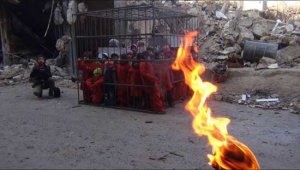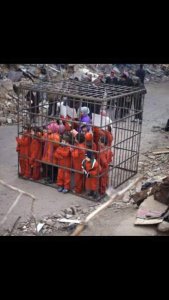Meget elegant fra Boris Johnson:
Perhaps I shouldn’t care as much as I do. These victims aren’t real people, after all. They are just mouldering old statues, and they aren’t even statues of ordinary people. They are bizarre Assyrian gods. They have the bodies of bulls, with cloven feet and those peculiar ringlet beards in the shape of typewriters. No one believes in that religion any more, and the people who made the statues have been dead for thousands of years.
Who cares if someone attacks them with a digger? Who cares if they get a stick of jihadi dynamite up their sneering nostrils? Why the big fat fuss? And perhaps I am allowing myself to get a bit carried away when I hear about the destruction of the famous cities of Mesopotamia. I expect that some people will take the view that they are just a bunch of ruins. Most of the stone buildings have long since lost their roofs, and their real estate value is low. You could try to turn them into something useful, like a restaurant or a car park – but you wouldn’t get planning permission.
Who really minds if the Isil terrorists decide to flatten them? Most people would seem never to have heard of Nimrud, or Hatra or Nineveh. Most people apparently don’t give a monkeys about Ashurnasirpal or Tiglath-Pileser, or the fate of their imperial palaces. At least, I assume they don’t much care – because otherwise I simply cannot understand the sickening silence and complacency with which we are absorbing news of this tragedy.
There are all sorts of reasons why I loathe Islamic State (Isil). They commit crimes of hideous violence against living human beings – defenestrating gays, beheading minorities, raping women, and so on. But there is something about their assault on the history of the region – their moronic demolition of the past – that has filled me with a special blackness and despair. I am not a soldier. It is a long time since I was trained to use a .303 rifle or a general purpose machine gun. But if someone told me that they were forming an Antiquities Protection Force – a special brigade of pipe-puffing leather-elbowed history buffs and ancient monument fetishists, dedicated to repelling the attacks of the barbarians – I think I would be very tempted to sign up.
Whatever you may say about the appalling modern history of Iraq, the territory itself is the cradle of civilisation. This is where human beings first learnt to live in cities; this is where they came up with fired bricks, and paved streets. This is the civilisation that gave us the first types of writing. Here is not just the story of the Middle East; this is the story of the entire human race. The friezes of the Assyrians are astonishing in their intricacy and beauty – lion hunts, battles, massacres, farming, weddings. With their arrangements of horses in profile, they are the direct and obvious ancestors of the Greek bas-reliefs that launched our own Western artistic tradition.
Of course it is a disaster for the long-term future of Iraq and Syria – with their huge potential, in peacetime, for tourism – that they should suffer the destruction of these potential visitor attractions. But these artefacts and ruins do not belong to the people who happen now to claim sovereignty over these currently wretched deserts. They are the property of all mankind. What is the point of having a United Nations – what is the point of having any ability to project force overseas – if we do not come up with a way to safeguard our common heritage?
We are struggling at the moment to stop brainwashed young Britons from going out to fight for Isil, or to become “jihadi brides”. On Sunday the Turks succeeded in intercepting three deluded souls from the London area, and they will now come back to face the music. They will almost certainly be charged with preparing acts of terrorism – and rightly. But it has emerged in the past few days that a young Kurdish woman has also been charged with similar offences, even though she intended to go off and help the Peshmerga – the sworn opponents of Isil.
We can all see the difficulty here. We need to deter young people from going off to this hellish conflict, even if it means that the prohibition falls equally on those who have become radicalised jihadis, and on those who want to combat their mania. But I refuse to accept that there is a moral equivalence between the two sides. On the contrary: the Kurds more or less share our objectives, while Isil are nihilistic and barbarian and cruel beyond belief. Of course we are nervous of any more British involvement, other than the current air strikes and behind-the-scenes training. But then what are we doing to stop the destruction of the monuments? We need a strategy, and fast.
The potential for calamity is enormous – imagine what these people – Isil – could do to the great Roman ruins of Libya. The world may be on the verge of losing Leptis Magna. It makes me weep with fury even to think of it. I don’t care how we do it – whether we set up a UN Cultural Protection Force, or whether we now team up with the Americans, the French and every other nation that cares about the past. We cannot allow these people to smash our history, our common story. They must be defeated.
In the meantime let us give thanks again for the British Museum, and the extraordinary efforts of Austen Henry Layard in the 19th century. It was Layard who moved those lamassus – the huge bearded statues – from Nimrud to London, where they can be seen and enjoyed to this day. They are one of the glories of the museum, and if they hadn’t come to London they would now be smashed to smithereens by deranged Islamist ideologues. Think of that, next time you hear some Lefty complain that the Museum is full of stolen treasures. Britain saved those masterpieces, just as Elgin saved the marbles from the Ottoman lime kiln. Now we have to save the ancient cities from the greatest threat since the 13th-century Mongol hordes.













